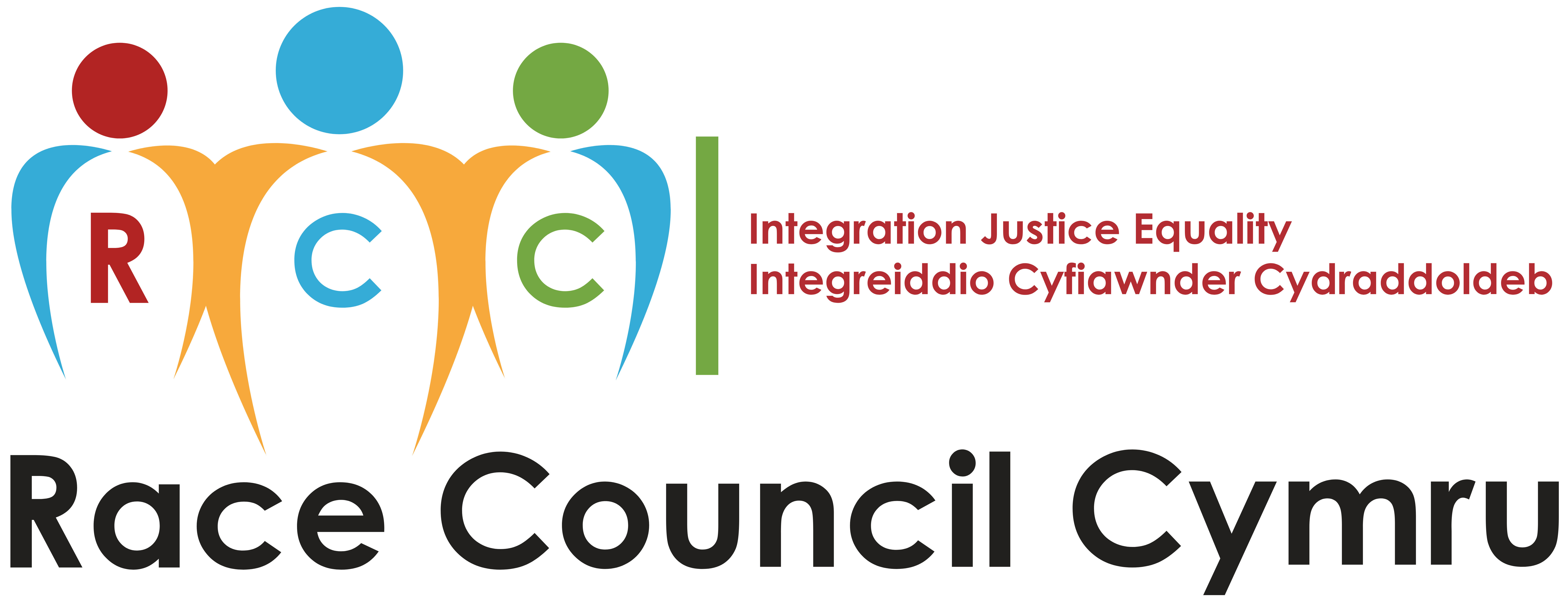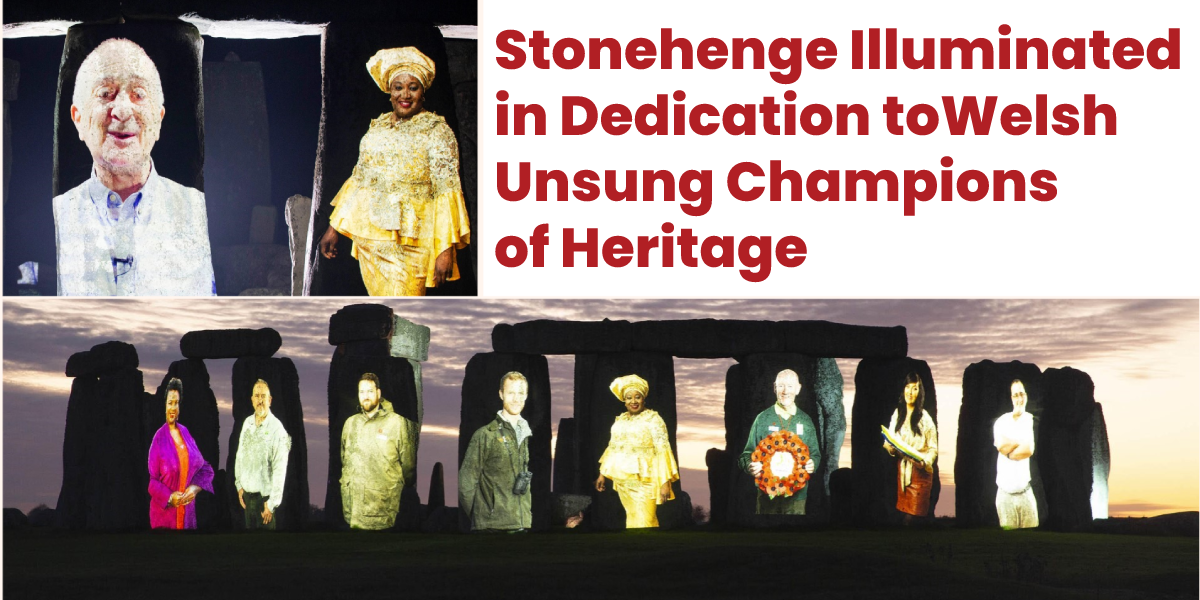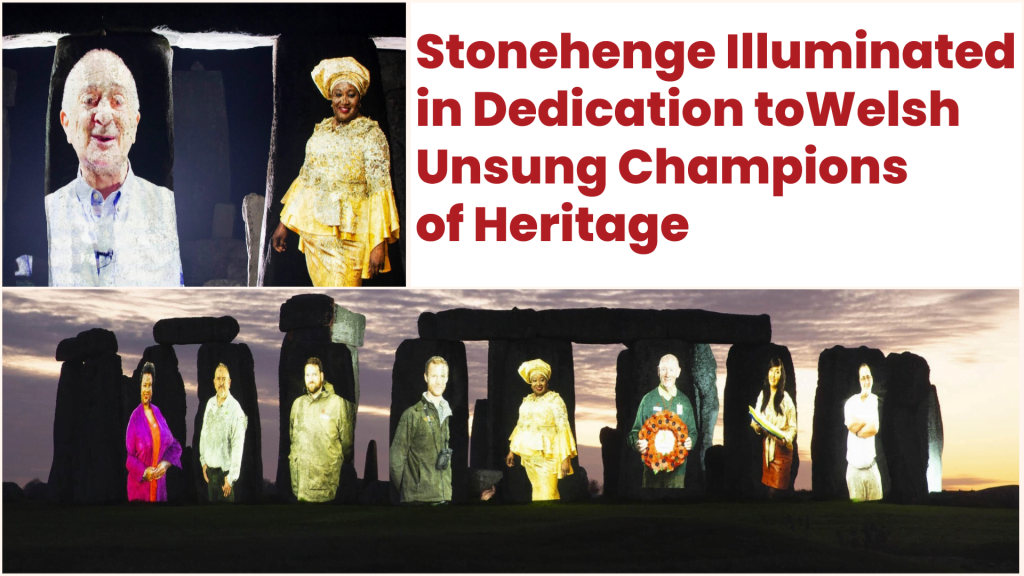Stonehenge Illuminated in Dedication to Welsh Unsung Champions of Heritage
World Famous Stonehenge Illuminated in Dedication to Welsh Unsung Champions of Heritage
- Today TV historian, Sir Tony Robinson, bestowed a unique honour on some of the individuals who work tirelessly to keep the UK’s heritage alive all year round, especially during the COVID-19 pandemic
- In the form of a night-time installation, which beams a message of hope for the whole country, the stones of one of the world’s most famous prehistoric monuments were lit up with the faces of eight members of the public for the first time, in dedication to their support of heritage projects during the pandemic
- Lee Turner from the Penllergare Trust and Uzo Iwobi OBE, founder of Race Council Cymru Wales are two of the ‘unsung champions of heritage’ whose images illuminate the famous site in honour of their work in 2020
- The homage comes as the results of new National Lottery research announced today highlights that 73% Welsh people credit visiting outdoor spaces with having a positive effect on their mental wellbeing this year, whilst just under half (45%) say that heritage sites make them feel proud of their local area.
- Heritage sites across the UK are being supported by the National Lottery through the COVID-19 pandemic with30m raised each week for good causes by National Lottery players.
Today, the images of a Bridgend Conservationist and a Swansea equalities practitioner have illuminated the 5,000-year-old sarsen stones of Stonehenge. TV’s Sir Tony Robinson unveiled the historic takeover of the national monument with eight ‘unsung heritage champions’ from across the UK adorning the stones. Prohibited from attending the display due to current restrictions, a video projection of Sir Tony acted to first illuminate the historic stones and introduce the momentous display.
The night-time celebration used eight projectors to honour remarkable individuals who have worked tirelessly to keep the UK’s heritage accessible during the pandemic and beyond, with the support of National Lottery funding, or who have been recognised for their dedication to the sector over a number of years.
With lockdowns and travel restrictions becoming the new normal, many green spaces, public gardens and historic sites have played an increasingly pivotal role in people’s lives. New insights1 released today from The National Lottery, which has helped fund over 1,000 heritage sites and projects across the UK this year, reveals that 73% of Welsh people say outdoor spaces have had a positive effect on their mental wellbeing during the pandemic. A further four in 10 (40%) said that heritage sites have made them feel more relaxed and less anxious in difficult times, whilst 45% say that heritage sites make them feel proud of their local area.
Until lockdown, Lee Turner was the office-bound manager for The Penllergare Trust working to restore the prestigious Welsh heritage site. But with all his staff on furlough, Lee’s challenges grew quickly, operating as a fundraiser, woodcutter, warden, social media manager and human resources manager– coupled with all his usual administrative responsibilities.
Set up in 2000, The Penllergare Trust aims to restore and protect an area of 268 acres, five miles outside Swansea, including a large walled garden and an orchid house that was thought to be one of the first in the UK. During lockdown and beyond, residents in the surrounding areas use the green space frequently for dog walking and family walks
Lee said: “The toughest moment was halfway through the first lockdown, when I was just completely exhausted. I was too busy to take any annual leave, and there always seemed to be loads of jobs on the list. I was working through weekends and evenings and then finally got a week off once we’d started to bring back other staff part-time at the end of August.
“We’re safeguarding this amazing site in Swansea that was long forgotten and protecting the wildlife.”
Swansea-based law professor Uzo Iwobi OBE, founder of Race Council Cymru Wales, worked despite the pandemic to deliver the first ever Black History Wales 365 initiative, designed to recognise the contributions of people of African descent. The movement is comprised of an ambitious year-long educational, heritage and cultural programme of events.
Uzo also supported the grassroots ethnic minority communities during the pandemic by setting up a BAME Covid support group, which comprised of over 70 leaders across Wales and a WhatsApp group for 40 diverse organisations to share learnings, support and best practice. She convened Zoom sessions, teaching elders digital skills and providing virtual cuddles across the internet.
Under Uzo’s guidance, Race Council Cymru also launched The Windrush Heritage Project – a National Lottery funded project that tells the stories of Wales’ Windrush generation in a virtual exhibition.
Uzo said: “The BAME Covid group has kept people sane, connected and together. We needed to make sure that The Race Council created an environment in the grassroots, delivering food parcels and doing whatever people needed from us.
“There were people from so many different religions and beliefs coming together through these groups. This pandemic is a war on humanity and for us to come through it, we have to join up and support one another.”
Sir Tony Robinson said: “I love the fact that Stonehenge is being lit up as a tribute to some of the country’s key project workers and volunteers, letting the public know about the hard work they’ve been doing to keep our heritage accessible to everyone using National Lottery funding. Without the graft and tireless effort of these wonderful people, our much-loved heritage would be more at risk than ever this year”.
“As a nation we have a deep love for our open spaces and historic places. Understanding our heritage makes us feel closer to where we live and can bring a great deal of joy. Lots of us have spent many hours during lockdown enjoying our culture and heritage, and these findings prove what a positive impact this has had on people’s happiness and well-being, especially during such difficult times.”
Stonehenge is just one of the heritage sites in the UK which has faced uncertainty during the pandemic. There are strong and mysterious historic links between Wales and Stonehenge. The very large standing stones at Stonehenge are of ‘sarsen’, a local sandstone, but the smaller ones, known as ‘bluestones’, come from the Preseli hills in the Pembrokeshire Coast National Park. How these stones were transported from Wales over a distance of more than 250 kilometres thousands of years ago still remains a mystery.
National Lottery players raise around £30 million for good causes every week. With the help of this funding, thousands of people across the UK are supporting their communities in response to the Covid-19 pandemic. These efforts are making a huge difference to people’s wellbeing, particularly those who are vulnerable and isolated.
Ros Kerslake CBE, Chief Executive of The National Lottery Heritage Fund, said: “The National Lottery is playing a crucial role in supporting heritage sites and projects during the crisis, but it’s the important work of the thousands of amazing individuals, some of whom we are celebrating and honouring today, that keep these places going and make our visits memorable.
“I would like to thank each and every one of them for their passion, commitment and the profound and positive impact they are having on the sector. None of this would have been possible of course without National Lottery players, who raise around £30 million each week for good causes.”
For further information, case studies and images, please contact:
- Melanie Walker, [email protected]
- Francesca Hilman, [email protected]
- Oswyn Hughes, [email protected]
Society’s Unheralded Champions: A National Lottery Report, October 2020 includes findings from a survey completed by a nationally representative sample of 6,000 adults from across the UK between 2-9 October 2020. It was scripted, hosted, sampled and data processed by Opinium
About The National Lottery:
- National Lottery players continue to raise around £30 million to good causes every week.
- Since The National Lottery began in 1994 it has made more than 5,700 millionaires but its primary purpose is giving to good causes.
- National Lottery players have raised over £42 billion for projects and over 629,000 grants have been awarded across the UK, that’s the equivalent of 200 life-changing projects in every UK postcode district.
- The majority (70 percent) of National Lottery grants across arts, community, heritage and sport projects are for £10,000 or less









